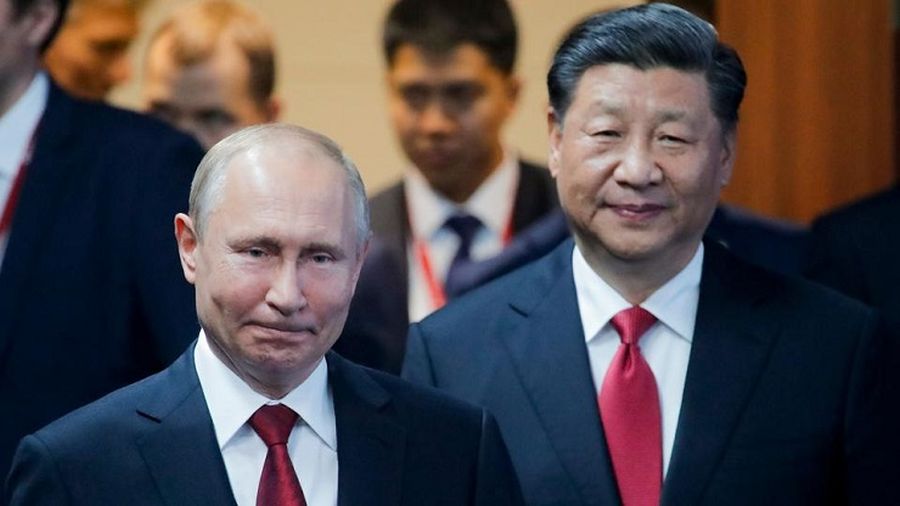China and Russia Face a Difficult Future in the Face of American Hypocrisy and Intransigence
One of the overhyped events of recent times has been the 3+ hours of telephone conversation between the presidents of China and the United States of America Xi Jinping and Joe Biden respectively. There are two major reasons to doubt the sincerity of the Americans over their accounts of the meeting.
The first is that the United States has a long and disgraceful history of professing one set of ideas or values and on the other hand by their actions giving a complete lie to their words. There is no reason to believe that Biden’s words carry any more truth than the multiple previous comments Americans have made about the Chinese.
Taiwan is a classic current example. On the one hand Biden professes the view that official United States policy remains that there is only one China, and that the island of Taiwan is part of that China. On the other hand, the United States has continued its aggressive sailing of warships in the South China Sea. The presence of these warships is clearly intended to send a signal to Beijing that any attempt to re-integrate Taiwan into the mainland will be forcibly resisted.
The fact of eventual reunification is a Chinese red line. Unless there is an unlikely change of heart by the Taiwanese authorities, the island will eventually be reinstated to the embrace of the mainland. The United States, not only by its shipping actions in the South China Sea, but also by its recent suggestion that Taiwan should join the United Nations is clearly determined to prevent the reunification of the two China’s.
Biden would do well to look at several recent evaluations by both the Department of Defence and by independent agencies which unanimously conclude that in any confrontation between China and the United States in the South China Sea the Americans invariably lose. This sobering evaluation is not sufficient, it seems, to encourage a rethink of the China policy by America’s political leaders.
The second clue to the real United States intensions about China is the tariffs that have been applied to Chinese exports to the UnitedStates. The tariffs appear to have had little effect on the volume of Chinese goods sold to America. They have however, significantly increased the price of those goods. One result has been the recent upsurge in United States inflation, now running at more than 7% per annum.
The tariffs have had no effect on United States investment in China. The hollowing out of the United States industrial base continues with an ever-smaller share of goods sold in the United States carrying a “Made in the USA label.” It is difficult to see any policy changes that are going to influence this trend.
The net result of these changes is reflected in the relative size of the Chinese and United States economies. Measured in terms of parity purchasing power, the Chinese economy is already larger than that of the United States, and that difference will continue to grow in China’s favour.
The reality of these figures is another reason for United States hostility towards China. For the last 70 years since the end of World War II the United States was undoubtedly the world’ largest economy. This dominance heavily influenced its political aims, not hesitating to use its dominance of the world’s major trading organisations as a vehicle to try and arrange the affairs of potential competitors to ensure that it maintained number one spot.
That pre-eminence is now a thing of the past. Although the United States continues its strong-arm tactics through such organisations such as the World Bank, the Chinese economy, through its huge multi trillion-dollar reserves, now poses a substantial challenge to that previous US dominance. The Belt and Road Initiative, which now has more than 140 members, is the clearest example of the fundamental shift in the structure of the world economy and a significant measure of the amount of the relative importance of the two economies.
A similar two-faced attitude can be seen in the United States attitude towards Russia. Here again, the position of Joe Biden is exposed for all its hypocrisy. Prior to his Geneva meeting with Vladimir Putin, Biden had labelled Putin a “killer”. This is on a par with his similar description of Xi as a “thug”. In both cases, Biden’s meeting with the two men expressed Bon Ami and goodwill.
As always, it is important to look at not what the United States says, but what it actually does. In Russia’s case the West used its mouthpiece, the Secretary General of NATO Jens Stoltenberg to sound multiple alarms about alleged Russian misbehaviour vis-à-vis its European neighbours.
According to Stoltenberg, the Russians are amassing its troops on Ukrainian border as a prelude to an imminent invasion. That there is no actual evidence to support this allegation seems not to trouble Stoltenberg. The situation in Ukraine remains tense, althoughStoltenberg will never acknowledge that not the least of the reasons for this is the utter refusal of the Ukrainian government to adhere to the terms of the Minsk agreement that it agreed to in 2015.
The United States also makes encouraging noises toward Ukraine leading the latter to believe that it cannot only continue to ignore its obligations under the Minsk agreement, but that it will be rewarded with membership of NATO. In encouraging this belief, it not only encourages the wilful ignoring of its earlier agreement under the Minsk accords, it actually encourages the continued unlawful attacks upon the civilian population of the Donbass.
The United States and the British also encourage the Ukrainians to believe that they can recover Crimea. This is manifestly absurd. It completely ignores the actual history of Crimea which was only a part of Ukraine for a relatively brief period in the Communist era, but also ignores the democratically expressed wishes of the Crimean people who overwhelmingly voted in 2015 to re-join Russia. The two operative words here are “voted” and “re-join” which reflects both the democratic choice of the Crimean people, and the actual history of the region. The British and their allies overlook for example that feature of history known as the Crimean war when in the 1850s they and their allies fought Russia in that territory.
Putin has made it clear that Ukraine joining NATO is absolutely out of the question, a statement that both the Ukrainian and the United States government seem intent on ignoring. I suspect that Ukraine and Taiwan will be the two great flashpoints of the current decade.
In both cases, China and Russia are determined to maintain their viewpoints. In both cases, the United States continues to undermine the position of both countries with its hypocritical support of Taiwan in one case, and equally giving critical support to Ukrainian ambitions on the other.
In the case of the Donbass, they are overwhelmingly a Russian speaking population and will not be abandoned by Putin. It seems equally likely that Ukrainian intransigence is also not negotiable. The scene is therefore set for some very troubled times.







